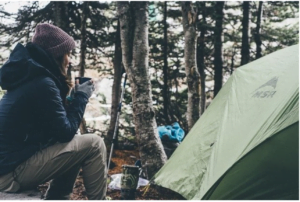 Getting into the Great Outdoors is not limited to people who are able-bodied. Anybody can get out and enjoy the fresh air, stunning scenery, and being close to nature. Yes, people with disabilities or are advanced in age have to take extra measures and require more planning, but that doesn’t make it off-limits. Basically, if you want to get out there and go camping, you can certainly do so. But, you have to do things a certain way to ensure that you stay safe while there and can actually enjoy the experience.
Getting into the Great Outdoors is not limited to people who are able-bodied. Anybody can get out and enjoy the fresh air, stunning scenery, and being close to nature. Yes, people with disabilities or are advanced in age have to take extra measures and require more planning, but that doesn’t make it off-limits. Basically, if you want to get out there and go camping, you can certainly do so. But, you have to do things a certain way to ensure that you stay safe while there and can actually enjoy the experience.
In this article, I will go over several ways that you can take charge and not let your lack of mobility slow you down when it comes to camping.
Do a practice run
A good way to get started is to do a sort of practice session first. This will shine a light on the things that you have to make sure to take care of before you go for an actual camp out.
You should try a night in an off-grid cabin, for instance, rather than go out in a tent. This will give you the opportunity to try out the gear you need to bring to see if it will work for you. For instance, you may find that you have trouble with clasps then you know that you need to replace them with a magnetic closure as this will pose a problem at a campsite.
You’re going to get an idea of how to get around certain obstacles based on your mobility issues to take with you for the next, real trip.
Do your research
There are a lot more handicapped-accessible campgrounds out there than you probably realize. Do a search online of some sites near you that can accommodate your disability or mobility issue specifically.
There are many sites that can accommodate a wheelchair, for instance. If putting up the tent is the issue, then you may find some sites that are willing to pitch the tent for you or have somebody give you a hand. There may be an extra charge for this so make sure to ask.
Wild camping is going to pose some major obstacles when it comes to accessing the camp pitch. Hopefully, you can talk to other people online who have your disability and have gone before. They can give you some directions on the best place to go that will give you a good experience. In fact, you may even find some people to go with that are experienced in camping with a disability.
Have a backup plan
One thing is certain when it comes to camping, even when you don’t have mobility issues. And that is there is always going to be something that doesn’t go according to plan. For some, this may simply pose an inconvenience without severely impacting the trip.
When you have issues with a disability or mobility it can spell disaster when something goes wrong. Make sure to have a plan B for anything that may pose a problem. Your safety could depend on it so have all kinds of potential problems thought out beforehand.

